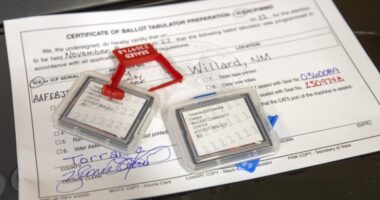There is an illusion we all live with. It’s part of what keeps society together, what keeps food on the shelves, what keeps people going to work and gas in our cars and each of us getting up every day and heading out into the world. The illusion is that we are safe. That we can breathe and touch and eat and hook up and visit our families and it will all be OK. That if we get sick, we get better.
That illusion is shattered.
It has taken me six days to write these few hundred words. The exhaustion is always there, pulling me backward as I try to move forward.
It has taken me six days to write these few hundred words. Exhaustion. The exhaustion is always there, pulling me backward as I try to move forward. The brain fog and headaches make getting through most days a challenge that I thought I would never have to face. What was I doing in the fridge? What did my son, Milo, just ask me? Have I taken my meds? Each task, each bit of focus, is 10 times more expensive than it was before I had Covid-19.
But the worst is the fear.
I didn’t infect my family. My parents are safe. My children and husband are safe — from me.
But the fact that they haven’t been infected means they are definitely still vulnerable. I have nightmares of losing my mom, of my husband, David, in the hospital, of explaining to my kids the very worst news they would ever hear. As someone who already struggled with generalized anxiety disorder, I find that this fear adds an entirely new dimension of hell to daily life.
I’ve had to find new reasons to get out of bed. “Safe” is no longer enough.
Maybe that’s true for all of us.
We saw it in the early days, when we stood on our balconies and cheered for the first responders and sang together in celebration of our common bond. Back before hundreds of thousands of people in the U.S. died and we believed we were going to power through, that optimism was the buoy that would keep us afloat on the roughest of seas. But optimism isn’t enough. It can face only so much proof that it is unwarranted. Optimism was buried in the graves of the almost 300,000 people in America and more than 1.4 million worldwide who have died from Covid-19. It is a ghost, haunting us.
Where we used to give one another bemused looks in grocery stores at the empty aisles of toilet paper, we now glare from behind our hidden faces, looking for the threat. We rightfully scorn those who would risk everyone else by not wearing masks, unless we are among those selfish masses arrogant in our ignorance. We no longer sing, and we no longer cheer. We have lost that thing that brought us together in this. It has been cut in pieces by an incompetent response, a willfully stupid government and the relentless toll of death and sickness and fear.
We are less than what we were.
We are diminished by whom we have lost. The sum of their absence is nearly as great as the sum of their presence was. The weight of their loss bends us over, hunched as though against a strong wind when we venture out into the world and see other people walking. We turn away. We wrap ourselves in separation. We find armor in loneliness. We all suffer. Many of us suffer needlessly, left without jobs and without income by a government that seems to simply not care. It didn’t have to be this way, and that adds to the exhaustion. Anger — fury — is exhausting. And ever present.
My hair is no longer falling out. For weeks, I would find it in great clumps when I brushed my hair. At first, I cried. Soon, I was numb. Another thing to endure in this crushing onslaught of things to endure. I couldn’t imagine how I had any hair left and hoped I would be as brave and strong and beautiful as people like Ayanna Pressley, whose alopecia took her hair long before Covid-19 took mine. I tried to find inspiration in the millions of cancer survivors and other strong and inspiring people who have endured.
But inspiration is difficult these days.
One way we can find it is in the stories we tell one another, about the things each of us has experienced or feared or seen as we struggled through the hellscape of 2020. I don’t know if this is inspiring. What does “inspiring” even mean in the face of a pandemic? Can you be inspired to avoid a virus? I truly don’t know. But I do know that these stories are powerful. I know that they connect to parts of us that have been wounded by this virus, by those we have lost.
If I’ve learned anything in a life of acting and activism, it is this: Stories matter. Stories might not be the things that lift us out of the pandemic, but they will be the things that allow us to reconnect after. They will be the touchstones that help us build back up, better than we were before. They will help us remember what we have lost and find our way back to who we were before.
And until we get there, we endure.
This is an adapted excerpt from “Covid Chronicles,” an illustrated series of real portraits from the coronavirus front lines, which will be released in bookstores Tuesday. The original 10-part series debuted on NBC News over the summer. Reprinted with permission.
Source: | This article originally belongs to Nbcnews.com











